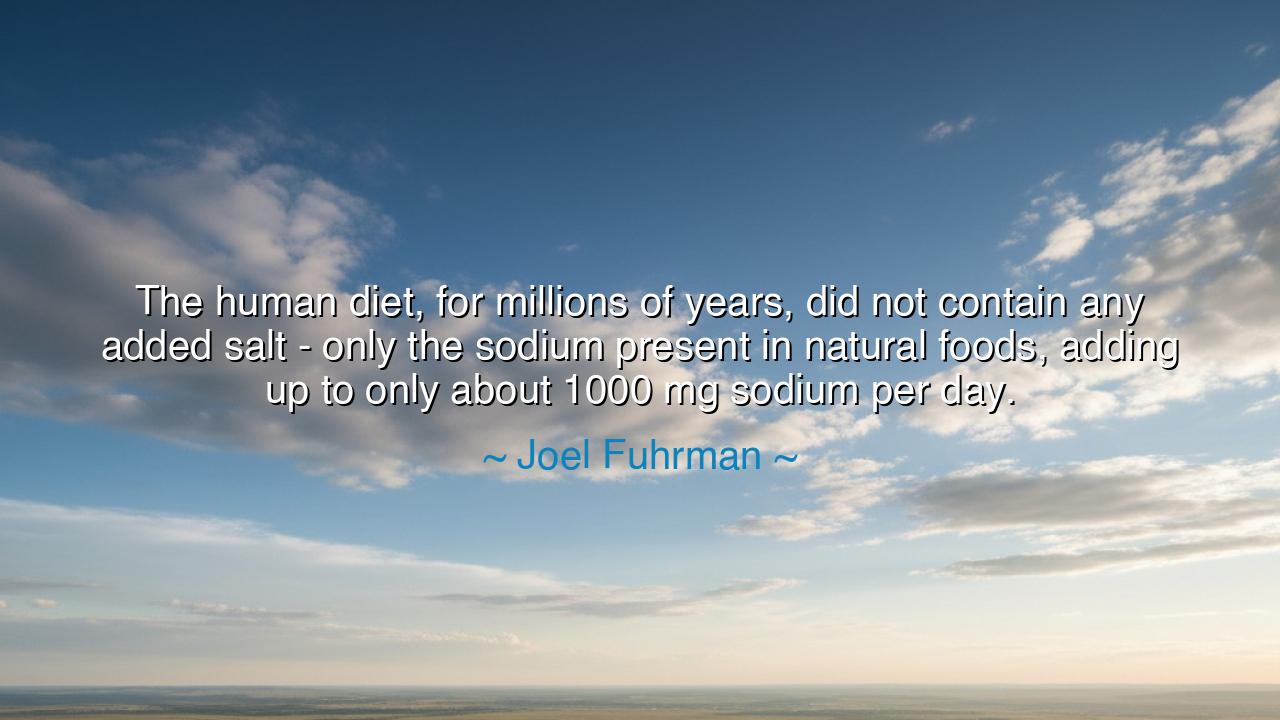
The human diet, for millions of years, did not contain any added
The human diet, for millions of years, did not contain any added salt - only the sodium present in natural foods, adding up to only about 1000 mg sodium per day.






"The human diet, for millions of years, did not contain any added salt — only the sodium present in natural foods, adding up to only about 1000 mg sodium per day." – Joel Fuhrman
In these words, Joel Fuhrman does more than describe nutrition—he calls us back to the ancient harmony from which humanity has drifted. He speaks of a time when the human diet flowed in rhythm with the earth, when the body and nature were one. For countless generations, men and women drew their sustenance from the wild: from fruit plucked under the sun, roots pulled from soil, and flesh hunted from beasts that roamed the plains. In those early days, there was no added salt, no artifices of flavor to awaken false desires. The salt they consumed came only as the earth intended—woven into the grains, greens, and flesh of the living world. Their lives were simple, their tastes pure, and their bodies moved as nature’s own design.
In this quote lies a reminder and a warning. For the modern appetite, with its abundance of indulgence, has forgotten this ancient balance. What once was a necessity has become excess; what once was clean has been corrupted by overuse. Salt—once precious and rare—is now abundant and constant, found not only in the food we eat but in the cravings that rule us. Dr. Fuhrman’s words recall the time before this abundance, when the body’s wisdom guided the hand, and the body’s needs were met by the land itself. He reminds us that our physiology—the sacred design of our ancestors—remains attuned to a world that no longer exists.
The ancients, too, understood the paradox of salt. It was revered and feared alike, a substance that could preserve life but also destroy it. In Rome, soldiers were sometimes paid in salt—the origin of the word salary—for it was deemed essential, even holy. Yet the wise knew that too much of it spoiled the flesh and poisoned the blood. The philosopher Hippocrates, father of medicine, wrote that “those who eat salt in excess will dry their veins and stiffen their hearts.” Thus, the balance of salt became a metaphor for the balance of life itself: too little, and the body weakens; too much, and the body withers. Fuhrman’s teaching is the continuation of this eternal truth—that the abundance of the modern table has made slaves of those who were once free.
To understand the depth of his message, we must imagine the hunter-gatherers of prehistory. Their diets were rich in plants, fruits, and the lean meats of wild creatures. They did not sprinkle crystals of the sea over their meals, nor dip their foods in the brine of indulgence. Their sodium intake, as Fuhrman notes, was a mere 1000 milligrams per day, not because they restrained themselves, but because the earth restrained them. Nature set the measure, and they obeyed. In that obedience lay strength: their hearts beat strong, their blood flowed pure, their senses were sharp and alive. They were not dulled by craving; they were sustained by balance.
As civilizations rose, however, abundance brought both progress and peril. Salt became not only a seasoning but a symbol of wealth, power, and preservation. It crossed deserts on caravans, sparked wars, and built empires. Yet, as it entered every kitchen and market, humanity’s taste for salt grew louder than its wisdom. What was once rare became ordinary, and what was once sacred became addiction. Dr. Fuhrman’s reminder is thus not simply about diet—it is about returning to moderation, about freeing the body from the tyranny of overstimulation. For in simplicity lies vitality, and in restraint lies health.
The meaning of his words, then, reaches beyond food. It speaks to a broader truth of life: that abundance without wisdom leads to decay. The body, like the spirit, thrives when it honors natural limits. Just as salt must be measured, so too must pleasure, wealth, and ambition. The over-seasoned life numbs the senses and blinds the heart, while the balanced life restores clarity and strength. By eating as our ancestors once did—mindfully, humbly, with gratitude for the earth—we return to our original state of harmony.
The lesson is clear: simplify to thrive. Let the body taste the true flavor of the earth again. Seek nourishment not in what is added, but in what is whole. Avoid the excesses that weaken the spirit; embrace the balance that sustains it. Take Fuhrman’s teaching as both counsel and challenge—to live as though your health were sacred, and your choices were offerings to the generations before and after you.
For the ancient body still dwells within us, waiting to be remembered. And when we return to its wisdom—when we cast away the needless salt and rediscover the essence of nature—we will find that health is not a pursuit but a homecoming. The earth, in its quiet generosity, has already given us all we need. It is we who must learn, once again, to receive it in balance, gratitude, and grace.






AAdministratorAdministrator
Welcome, honored guests. Please leave a comment, we will respond soon